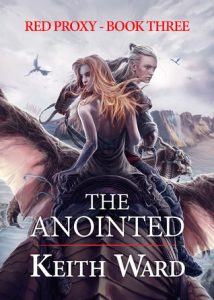The Anointed by Keith Ward (SPFBO Review)
The Fantasy Hive’s own T.O. Munro has stepped in to help out with the final stages of SPFBO 4!
SPFBO – aka the Self-Published Fantasy Blog-Off – is a contest organised by Mark Lawrence with the aim of celebrating the best amongst – you guessed it – self-published fantasy. Read more about its origins here, and check out the current finalists’ scoreboard here.
One of the SPFBO rules is that only first books in a series are eligible, but The Anointed is Keith Ward’s third Red Proxy novel. However, these books are interlinked – interrelated – but not strictly a series. They’re like Kristin Cashore’s Graceling novels (Graceling, Fire and Bitterblue) in that they function effectively as standalone novels drawing on a common world and themes. Nonetheless, throughout The Anointed it is clear that there is a substantial backstory in the form of the prequel novel 99 Days, set 15 years earlier. Xinlas – the key protagonist of The Anointed – was a mere baby in peril during the events of 99 Days while his father Ketram (one presumes) took centre stage then. However, I didn’t feel that prequel/sequel relationship impaired my reading of the book as an effective standalone story any more than it did in my first experience of Narnia through reading Voyage of the Dawn Treader.
 The Anointed’s relative strengths lie in Ward’s worldbuilding, in particular the idea of Span Transfer, where one person’s allotted years can be transferred to another to extend their lifespan. I saw a similar motif delivered brilliantly in a 2011 Amanda Seyfried and Justin Timberlake film “In Time” where years of life were the currency people traded, stored, stole, hoarded and died for want of. In Neal Shusterman’s book Unwind, we also see a society with a callous disregard for life – where the unwanted young are seen as spare parts to be recycled for others.
The Anointed’s relative strengths lie in Ward’s worldbuilding, in particular the idea of Span Transfer, where one person’s allotted years can be transferred to another to extend their lifespan. I saw a similar motif delivered brilliantly in a 2011 Amanda Seyfried and Justin Timberlake film “In Time” where years of life were the currency people traded, stored, stole, hoarded and died for want of. In Neal Shusterman’s book Unwind, we also see a society with a callous disregard for life – where the unwanted young are seen as spare parts to be recycled for others.
Ward creates a world built on a manifestly immoral premise which is largely accepted because it is long-established custom, and also because it most benefits the rich and powerful – like slavery in the 19th century.
As champion of the practice of Span Transfer, Ward casts King DuQuall, antagonist to our heroes. Unfortunately, Ward’s DuQuall lacks subtlety and nuance as a character. At times he reminded me of Lord Farquad from Shrek, at others – more scarily – of Donald Trump at his most incoherent demagoguery. While I struggled to accept that a popular gathering might fall for DuQuall’s clumsily expressed oratory, recent political experience suggested that it was all too possible.
Another theme of Ward’s world is that nothing floats. Wood, people – all sink in water. The words ‘float’ and ‘boat’ have no meaning for Xinlas or his family. It’s an interesting constraint to put on a world. Intercontinental trade, warfare and diplomacy are restricted only to what can be carried by dragons which – for Ward – serve a function somewhere between flying pack animals and winged hot air balloons.
The physicist in me struggled with this. I’ve taught children how to make hollowed-out floating boats from lumps of Plasticine which – as solid blocks – would otherwise sink. I’ve floated oil on water and compared the densities of different solids and liquids. A world where everything sinks like a stone in water, no matter what, does require a degree of critical disengagement beyond even the norm for a genre of intrinsically unreal fantastic worlds.
But that gives a mystical significance to the third element of Ward’s world: the hidden community of Peacewood, with its homely-named characters such as Roughbark, Goldleaf and the free-spirited Greengrass. The peacewood trees of Peacewood are the only material that floats, and from it their people make boats both great and small, and lifejackets stuffed with peacewood so those who tumble into the water can swim.
Peacewood shelters within rocky mountains, hidden by an invisible magical barrier: The Protection. It’s as if an Amish or Quaker community had been planted in the hidden city of Gondolin. Ward creates an interesting premise here. Conflict is unknown, community is all and lies are as foreign a concept to the people of Peacewood as floating is to the people beyond the veil of their protection. Greengrass is the only one curious enough to seek out the outside world, to want to find more and explore, and inevitably meet Xinlas.
However, the potential in Ward’s worldbuilding is not followed through in the execution. Despite some laudable attempts to show Xinlas as a flawed arrogant character in need of redemption, he remains fundamentally self-obsessed and unlikeable. Greengrass is understandably naïve, but does show a soundness of judgement that makes her easier to warm to.
Ward’s writing is overly reliant on exposition to telegraph both details of plot and character’s internal trains of thought and development. The elements of the plot, while individually intriguing, do not come together in a sufficiently convincing, coherent and satisfying whole.
At a talk from the BBC writer’s room I was reminded – repeatedly – how character must drive plot. However, here I felt not only that plot was driving character, but that the illogicalities within the plot made it too weak an engine really to shoulder the responsibility of making a clear success from the story.
While DuQuall’s ambition is on a collision course with Peacewood’s resources and culture, the resolution Ward provides does not serve either thread well. In particular (physicist at work again) I was puzzled at the journey times at work in the story’s denouement. When a few hours at most had passed in one location, other characters had managed a journey across one continent and half an ocean!
No book is perfect, but many shuffle off their weaknesses and cloak themselves in their strongest features for an ending that provides closure – maybe even brings a certain dampness to a cynical eye with even the most predictable attempts to tug heartstrings. Sadly, it is the weakest aspects of The Anointed that came to the fore for me in the last few pages, so that it ended with a whimper rather than a bang.
Final score: 5/10

